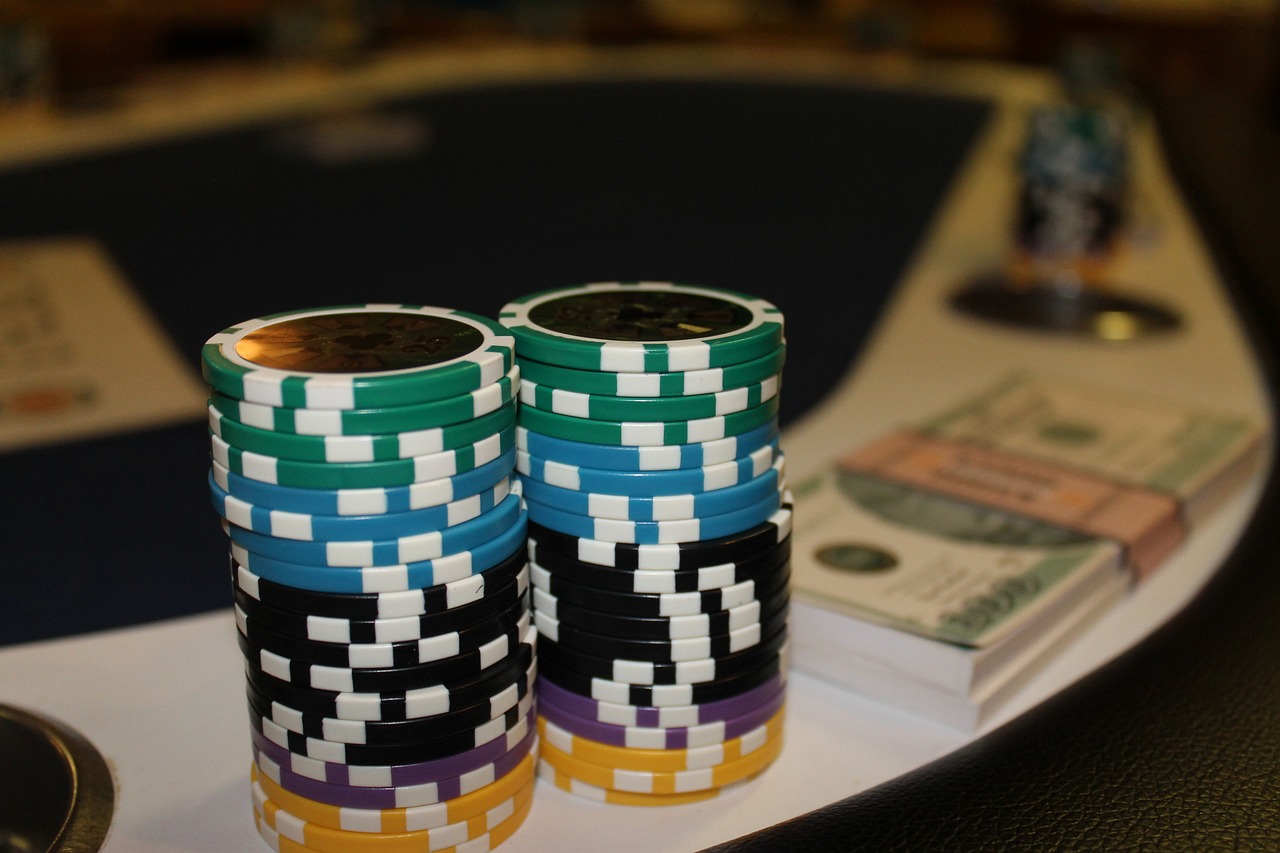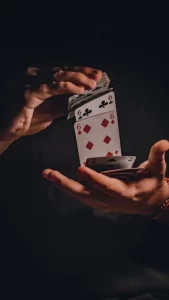Psychology plays a crucial role in the game of poker. It is not just about the cards you hold, but also about how you read your opponents and their behavior. By understanding the psychology behind the game, you can gain an edge over your opponents and increase your chances of winning. In this article, we will discuss some tips on how to use psychology to gain an edge in poker.
The Power of Body Language: How to Read Your Opponents in Poker
While mastering the rules and understanding the odds is important, being able to read your opponents and their body language can give you a significant edge. In this article, we will explore the power of body language in poker and how you can use psychology to gain an advantage at the table.
Body language is a nonverbal form of communication that can reveal a lot about a person’s thoughts and emotions. In poker, players use body language to bluff, deceive, and intimidate their opponents. By learning to read your opponents’ body language, you can gain valuable insights into their hand strength, confidence, and intentions.
One of the most important aspects of body language in poker is posture. A player who is sitting up straight and leaning forward is usually confident and engaged in the game. On the other hand, a player who is slouching or leaning back may be disinterested or unsure of their hand. Pay attention to your opponents’ posture and use it to gauge their level of confidence.
Another key aspect of body language in poker is facial expressions. A player’s face can reveal a lot about their emotions and intentions. For example, a player who is smiling or laughing may be trying to appear relaxed and confident, while a player who is frowning or scowling may be frustrated or angry. Look for subtle changes in your opponents’ facial expressions, such as a twitch or a raised eyebrow, which can indicate a strong hand or a bluff.
Eye contact is also an important aspect of body language in poker. A player who avoids eye contact may be trying to hide something or may be nervous about their hand. Conversely, a player who maintains steady eye contact may be trying to intimidate their opponents or may be confident in their hand. Pay attention to your opponents’ eye contact and use it to gauge their level of confidence and honesty.
In addition to reading your opponents’ body language, you can also use your own body language to influence the game. For example, maintaining a confident posture and making steady eye contact can make you appear more confident and intimidating to your opponents. Conversely, slouching or avoiding eye contact can make you appear weak or unsure of your hand.
It’s important to note that body language is not always a reliable indicator of a player’s hand strength or intentions. Some players may intentionally use false body language to deceive their opponents. Additionally, some players may have naturally nervous or fidgety body language, even when they have a strong hand. Therefore, it’s important to use body language as one tool in your arsenal of poker strategies, rather than relying on it exclusively.
In conclusion, body language is a powerful tool in poker that can give you valuable insights into your opponents’ thoughts and emotions. By learning to read your opponents’ posture, facial expressions, and eye contact, you can gain an edge at the table. Additionally, by using your own body language to appear confident and intimidating, you can influence the game in your favor. However, it’s important to remember that body language is not always a reliable indicator of a player’s hand strength or intentions, and should be used in conjunction with other poker strategies.
Mastering Emotional Control: Using Psychology to Stay Calm at the Poker Table
The first step in mastering emotional control is to understand the role of emotions in poker. Emotions can be both positive and negative. Positive emotions, such as excitement and confidence, can help you make better decisions and play more aggressively. Negative emotions, such as fear and anger, can cloud your judgment and lead to poor decisions.
The key to emotional control is to recognize when your emotions are getting the best of you and to take steps to manage them. One effective technique is to practice mindfulness. Mindfulness involves being aware of your thoughts and emotions without judgment. By practicing mindfulness, you can learn to observe your emotions without getting caught up in them.
Another technique for managing emotions is to use visualization. Visualization involves imagining yourself in a calm and relaxed state. By visualizing yourself as calm and in control, you can train your mind to respond to stressful situations in a more positive way.
Breathing exercises can also be helpful in managing emotions. When you feel yourself becoming anxious or stressed, take a few deep breaths and focus on your breathing. This can help to calm your mind and reduce the intensity of your emotions.
In addition to these techniques, it is important to develop a pre-game routine that helps you to stay calm and focused. This might include listening to music, doing some light exercise, or meditating. By establishing a routine, you can train your mind to associate these activities with a state of calm and relaxation.
It is also important to be aware of your triggers. Triggers are situations or events that can cause you to become emotional. For example, losing a big pot or being bluffed can be triggers for anger or frustration. By identifying your triggers, you can develop strategies for managing them. This might involve taking a break from the game, talking to a friend, or using a relaxation technique.
Finally, it is important to remember that emotional control is a skill that takes time and practice to develop. Don’t be too hard on yourself if you find yourself getting emotional at the poker table. Instead, use these experiences as opportunities to learn and grow.
In conclusion, emotional control is a crucial skill for success in poker. By understanding the role of emotions in the game and developing strategies for managing them, you can gain an edge over your opponents. Remember to practice mindfulness, visualization, breathing exercises, and establish a pre-game routine. Identify your triggers and develop strategies for managing them. With time and practice, you can become a master of emotional control and take your poker game to the next level.
The Art of Bluffing: How to Use Psychology to Trick Your Opponents
Bluffing is a fundamental aspect of poker. It involves making your opponents believe that you have a stronger hand than you actually do. The key to successful bluffing is to convince your opponents that you are confident in your hand, even if you are not. This is where psychology comes into play.
One of the most effective ways to bluff is to use body language to your advantage. Your body language can reveal a lot about your hand, so it is important to be aware of your movements and expressions. For example, if you have a weak hand, avoid fidgeting or looking nervous. Instead, maintain a calm and confident demeanor to make your opponents believe that you have a strong hand.
Another way to use psychology to your advantage is to manipulate your opponents’ emotions. This can be done by playing mind games and using psychological tactics to throw your opponents off their game. For example, you can use reverse psychology by acting weak when you have a strong hand, or vice versa. This can confuse your opponents and make them doubt their own hand, giving you an advantage.
Another effective tactic is to use the power of suggestion. This involves planting a seed in your opponents’ minds that can influence their decision-making. For example, you can make a comment about how strong your hand is, even if it is not, to make your opponents believe that you have a winning hand. This can cause them to fold or make a mistake, giving you an advantage.
It is also important to pay attention to your opponents’ behavior and reactions. This can give you valuable information about their hand and their level of confidence. For example, if your opponent is fidgeting or avoiding eye contact, they may be nervous or unsure of their hand. This can be a sign that they have a weak hand, giving you an opportunity to bluff or make a strong bet.
In addition to using psychology to bluff, it is also important to be able to detect when your opponents are bluffing. This requires a keen sense of observation and the ability to read your opponents’ body language and behavior. Look for signs of nervousness, hesitation, or inconsistency in their actions. These can be indicators that they are bluffing and can give you an opportunity to call their bluff and win the hand.
In conclusion, mastering the art of bluffing and using psychology to your advantage is essential for success in poker. By using body language, mind games, and the power of suggestion, you can manipulate your opponents’ emotions and gain an edge in the game. Remember to pay attention to your opponents’ behavior and reactions, and use your observations to make informed decisions. With practice and patience, you can become a master of the game and win big at the poker table.
Understanding Your Opponent’s Motivations: Using Psychology to Predict Their Moves
The first step in using psychology to your advantage is to understand your opponent’s motivations. People play poker for a variety of reasons, including the desire to win money, the thrill of competition, and the social aspect of the game. By observing your opponent’s behavior and listening to their words, you can gain insight into what motivates them.
For example, if your opponent is constantly talking about how much money they need to win, it’s likely that they are playing to make a profit. In this case, they may be more risk-averse and less likely to make bold moves. On the other hand, if your opponent is more focused on the social aspect of the game, they may be more willing to take risks and make flashy plays to impress their friends.
Once you have a sense of your opponent’s motivations, you can use this information to predict their moves. For example, if you know that your opponent is risk-averse, you can use this to your advantage by making small bets that they are more likely to call. Conversely, if you know that your opponent is more willing to take risks, you can use this to your advantage by making larger bets that they may be more likely to fold.
Another way to use psychology to your advantage is to pay attention to your opponent’s body language. Nonverbal cues such as facial expressions, posture, and hand movements can provide valuable information about your opponent’s state of mind. For example, if your opponent is slouching in their chair and avoiding eye contact, they may be feeling nervous or unsure of themselves. In this case, you may be able to bluff more effectively by making confident bets and acting as though you have a strong hand.
Conversely, if your opponent is sitting up straight and making direct eye contact, they may be feeling confident and in control. In this case, you may want to be more cautious and avoid making risky plays that could backfire.
It’s also important to pay attention to your own body language and behavior. Your opponents will be watching you just as closely as you are watching them, and any signs of nervousness or hesitation could give them an advantage. Make sure to maintain a calm and confident demeanor, even if you are feeling unsure of yourself.
Finally, it’s important to remember that psychology is just one aspect of the game. While understanding your opponent’s motivations and using psychology to predict their moves can give you an edge, it’s still important to master the technical aspects of the game and make smart strategic decisions. By combining a strong understanding of psychology with a solid foundation in poker strategy, you can become a formidable opponent at the table.
In conclusion, using psychology to gain an edge in poker requires a combination of observation, analysis, and strategic thinking. By understanding your opponent’s motivations, paying attention to their body language, and maintaining a confident demeanor, you can predict their moves and make smart strategic decisions. While psychology is just one aspect of the game, it can be a powerful tool in the hands of a skilled player.
The Importance of Mindset: How to Use Psychology to Stay Focused and Confident in Poker
One of the most important aspects of mindset in poker is staying focused. Distractions can be costly in poker, and losing focus for even a moment can lead to missed opportunities and costly mistakes. To stay focused, it is important to eliminate distractions and stay present in the moment. This means avoiding distractions like your phone or other electronic devices, and focusing on the game at hand.
Another important aspect of mindset in poker is confidence. Confidence is essential in poker because it allows you to make bold moves and take calculated risks. Without confidence, you may be hesitant to make the plays that can win you big pots. To build confidence in poker, it is important to focus on your strengths and successes. Celebrate your wins, no matter how small, and use them to build momentum and confidence.
One way to build confidence in poker is to use positive self-talk. Positive self-talk involves using affirmations and positive statements to reinforce your confidence and belief in yourself. For example, you might say to yourself, “I am a skilled player who can make the right decisions at the right time.” By repeating these positive statements to yourself, you can build your confidence and stay focused on the game.
Another important aspect of mindset in poker is managing your emotions. Emotions can be a powerful force in poker, and they can either work for you or against you. For example, if you become angry or frustrated after a bad beat, you may be more likely to make impulsive decisions that can cost you chips. On the other hand, if you can stay calm and composed, you can make rational decisions that are more likely to lead to success.
To manage your emotions in poker, it is important to recognize when you are feeling emotional and take steps to calm yourself down. This might involve taking a deep breath, taking a break from the game, or using visualization techniques to imagine yourself in a calm and focused state. By managing your emotions, you can stay focused and make better decisions at the table.
Finally, it is important to remember that mindset in poker is not a one-time thing. It requires ongoing effort and attention to maintain a positive and focused mindset. This means practicing mindfulness, positive self-talk, and emotional management on a regular basis. By doing so, you can develop a strong and resilient mindset that will help you succeed in poker and in life.
In conclusion, mindset is a critical aspect of poker that can give you a significant edge over your opponents. By staying focused, building confidence, managing your emotions, and practicing mindfulness, you can develop a strong and resilient mindset that will help you succeed at the table. So the next time you sit down to play poker, remember to focus on your mindset and use psychology to your advantage. To use psychology to gain an edge in poker, players should focus on observing their opponents’ behavior and body language, as well as controlling their own emotions and reactions. By understanding the psychological factors that influence decision-making in poker, players can make more informed choices and increase their chances of winning. Additionally, players should be aware of common psychological biases and avoid falling prey to them. Overall, incorporating psychological strategies into one’s poker game can lead to improved performance and success at the table.




